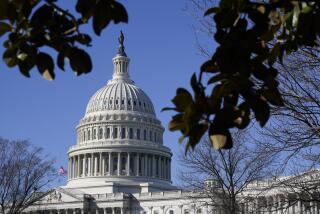Lobbying Tab Is $1.1 Billion for Half a Year
- Share via
WASHINGTON — As President Bush campaigned for reelection pledging to protect doctors and insurance companies from patient lawsuits while easing the tax burden on businesses, industry groups spent record amounts of money lobbying to influence the White House, Congress and their constituents.
Special interests spent $1.1 billion during the first half of 2004 on lobbyists and advertising campaigns, according to public records that interest groups are required to file with the Senate.
Topping the list of spenders were the U.S. Chamber of Commerce and the American Medical Assn., which spent a combined $39 million during the six-month period to appeal for medical liability limits, according to politicalmoneyline.com. The independent group tracks spending on political campaigns and lobbying.
Reports tallying lobbyist expenditures for the rest of the year are due in February -- and industry insiders expect the yearly total to exceed last year’s record of roughly $2 billion.
“A lot of business groups have been waiting for years, if not decades, for all the political stars to be aligned so they could get legislation passed on issues like medical malpractice,” said Stephen Moore, who heads the Club for Growth, a leading business advocacy group.
“The overall issue of lawsuit abuses and bringing a stop to them will mean that the lobbying frenzy will be even more intense in 2005,” Moore added.
So far in 2004, businesses and interest groups are paying their lobbyists at a record pace. This was the first year in which spending during the first six months topped $1 billion; businesses and interest groups spent about $963 million during the same period in 2003.
And the new figures demonstrate how the cash flow to lobbying firms on Washington’s K Street is accelerating -- up from an average of $128 million a month during the first half of 2000, the last year of the Clinton administration, to the 2004 monthly average of $176 million.
“Businesses and other interests sense an opportunity, and they are going to be spending a tremendous amount of money to ensure that they get their way,” said Larry Noble, executive director of the Center for Responsive Politics, a nonpartisan group that monitors lobbying practices. “No one should doubt that they’re spending this money for their own special interests and not the public interest.”
Other big spenders on lobbying during the first half of 2004 included General Electric Co., which spent $8.44 million on various issues, such as Iraq contracts and broadcast policies, and the Pharmaceutical Research and Manufacturers of America, which spent about $8 million on legislation affecting Medicare, drug issues and other healthcare matters.
The two major mortgage lenders, Fannie Mae and Freddie Mac, and the National Assn. of Realtors also spent millions of dollars.
The U.S. Chamber of Commerce, by far the top spender, spent about $30 million, according to the PoliticalMoneyLine website.
A spokeswoman said the total included money spent on lobbyists interacting with the administration and Congress in addition to election-related advertising directed at the public. She referred questions on specifics to Chamber officials, who did not return telephone calls.
The Chamber of Commerce, which historically refrains from presidential politics, spent millions this year on a group called the November Fund, which was formed to attack Democratic vice presidential nominee Sen. John Edwards of North Carolina for his work as a trial lawyer. Chamber executives said during the campaign that lawsuit liability was a key issue for the group.
A spokeswoman for the AMA declined to offer details about how the group spent its money but said that medical liability issues and Medicare reimbursements to doctors were key issues.
Interest groups are not required to say exactly how they spend the money. Instead, organizations and lobbying firms file reports listing the legislation they tried to influence and the total amount spent.
Noble, of the Center for Responsive Politics, said lobbyists often spend money on trips for members of Congress and other government officials to such places as hunting lodges and golf resorts.
“They do it legally, by calling it an educational trip,” he said.
Firms also look for connections to the party in control.
Among the firms and lobbyists that it hired, the AMA reported paying $60,000 to David Sibley, a former Republican Texas state senator who represented the Waco area before retiring from the Legislature to devote himself to lobbying. The president’s ranch in Crawford is outside Waco. Sibley said he was hired by the AMA to press its case with the administration.
“We’re getting ready to crank up on tort reform,” he said.
But asked to elaborate, Sibley declined, saying: “I see no upside to me talking about what I do for these guys.”
More to Read
Get the L.A. Times Politics newsletter
Deeply reported insights into legislation, politics and policy from Sacramento, Washington and beyond. In your inbox twice per week.
You may occasionally receive promotional content from the Los Angeles Times.










